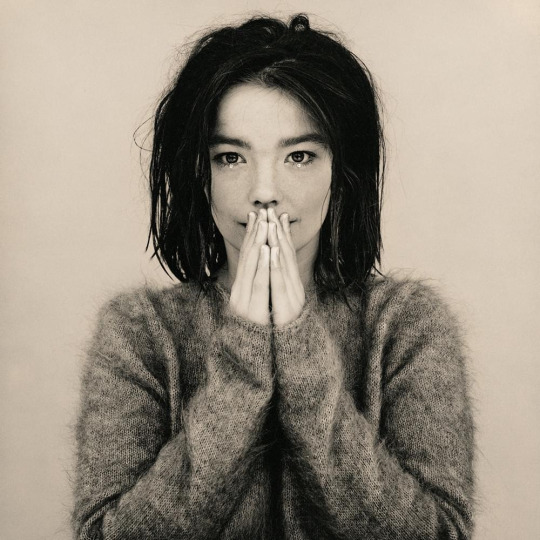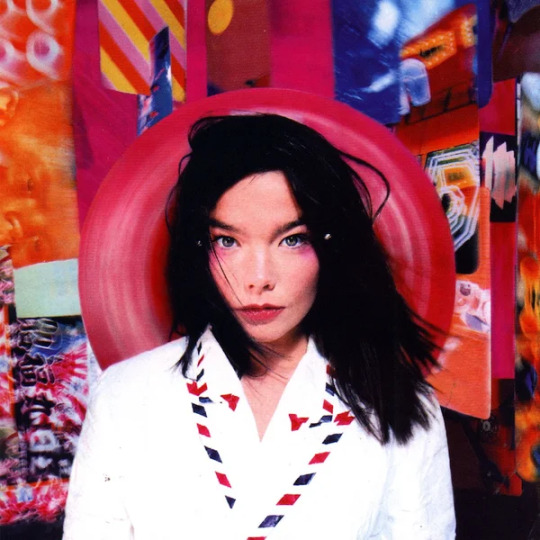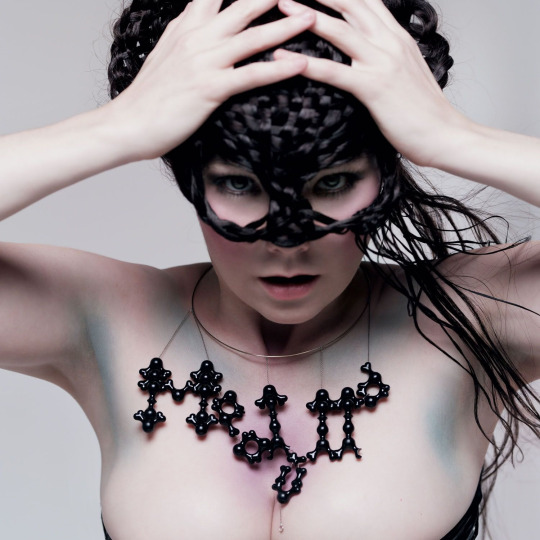#but my physics lecturers this quarter are amazingly chill!
Text
what is it with maths professors and awkwardly delivering silly but sweet jokes and looking so proud of themselves once they've finally gotten them out. it's the one trait they've all had in common.
#all of my maths professors have been really sweet#the physics and chemistry ppl to a man clearly just resented having to teach though#but my physics lecturers this quarter are amazingly chill!#they're great. they were like 'basically nobody fails this exam we're just here to look at photons and have fun' and you know what. i'm on#they livestreamed the tuesday demonstration on youtube skdjfsdjfgsdf#she speaks#cth adventure
3 notes
·
View notes
Text
Björk DISCOG REVIEW Part 1
One of the most recognized avant-garde singers in the world, Björk Guðmundsdóttir is an Icelandic artist who has been releasing critically acclaimed albums since the early 90s, and an icon in the experimental music scene. I thought it’d be an exciting experience to dive into her discography to find out if her music resonates with me, and to understand what this revered singer is all about. I decided to start with her major studio albums first, then moving on to her early work with Icelandic band The Sugarcubes and whatever else she has out there.
Debut

Björk’s properly titled debut is a wild amalgamation of sweet love songs, upbeat house music inspired by the UK’s early 90s scene, a hint of jazz, and of course, Björk’s enchanting voice. I won’t pretend to be a music university graduate or whatever, as I know close to nothing about what 90s music sounded like, what could have potentially influenced Björk on this album, nor will I try to give some sort of lecture about what is going on here; I’ll just cite what I enjoy and what I don’t, and why.
Debut feels authentic, it’s a finely crafted album, from its musical styles to its production to its songwriting. What spiked my interest immediately in it were the drums, and how fresh and varied they were; this is a very percussion-heavy album, the UK beats Björk implements are all about the infectious rhythms that enter your body and seem to control it, but even on tracks not so influenced by the nightclub life, the percussion is very good, in songs such as the opening Human Behaviour, with its fat bass drums, or the iconic, soothing Venus As a Boy, featuring tambourines, strong kicks, some rattle instrument, a prominent sampled echoing sound and a hint of bongos; these are all alongside various other rich instruments, violin passages that flow with the track perfectly, what sounds like xylophones peppering the track, all of this making this the best song in the album, in my opinion.
And when these instruments are not there, of course Björk herself makes up for it. Like Someone In Love is a beautiful ode to, well, love, comprised only of a harp, the singer’s eye-watering performance, and some ambient noise; it reminds me a bit too much of her cover of I Remember You, mostly because they’re both based on harps, but it is still very beautiful on its own. The Anchor Song is the emptiest on the record, closing the album up with some tension and overall introspection. It features only one verse from Björk sung two times, and like three saxophones? Definitely two at least, I’m not sure how they work, but it makes for a great, simplistic finisher (even if latter editions include Play Dead, a beautiful song, but not exactly fitting after the song before it).
Throughout the first handful of tracks, the pattern of “inward emotionally potent song sequenced by urban-life dance anthem, and back again” became apparent to me, but then broke after One Day did not transition into a dance track. Basically, my instant perception was that the record was this rollercoaster showcase of the hopeless romantic experience in a metropolitan, nocturnal city, and it may be, but if it is, it’s not as in-your-face as I initially thought. What catapulted these thoughts was the live version of There’s More To Life Than This, probably the most commercially-adept instrumental tune in the record, performed by Björk in a version purposefully awkward and weirdly personal, where she sings her second verse directly into a mic while the beat faintly plays in the background, fading further and further until the song flawlessly transitions to Like Someone In Love. It really makes you feel like your are at the Milk Bar, the night is packed, and Björk just pulls you into the bathroom and starts singing the rest of the song (for some reason); it reminded me of all those YouTube videos where the uploader takes a popular song, adds some background chatter, and soaks it all in reverb to give you the experience of listening to the song from the bathroom of a party. It is a distinct, creative way of spinning the original dance track around into something more, something that conveys this feeling of slight loneliness, even when surrounded by people, the central topic of the second song, Crying. The lyrics describe the big city, the huge crowds, but conversely the feeling of solitude and missing your loved one, or maybe even a place, it’s not explicitly told who or what Björk misses.
Romance is ever-present in Debut, through many incarnations. Big Time Sensuality, one of the most upbeat tracks here, is about a fresh romantic relationship, and the growing sensation of “something important (...) about to happen”, assumingly between Björk and whoever else. The house beat paints the scenario for this relationship as a club, by default. It brings you into this exciting nightlife, only for you to be pulled away immediately after by One Day, a track so cheerful it’s irresistible, and holding tight to the theme of romanticizing a loved one, then reaching Aeroplane in yet another beautiful transition. I have to admit this is the first song I don’t love in the album, I think it is good, and in the context of the album, definitely brings something new. What sets it apart is, this time around, the bongos are being used to their full extent, paired with birds chirping and a comfortable bass, incremented by occasional saxophone passages, this track ends up very tropical. After this, Come To Me is another passionate song, this time, Björk sings of comforting her partner and nurturing them, which naturally creates a super chill aura to the song. Accompanied by the violins and the lowkey guitars, it makes for a solid track, which in the context of the album I think eases the mood a bit too much, but is appreciated as a solid production, and closes out by bringing out the bongos once again, in a very nice outro (I should also note this is the first appearance of a real drum set on the album [I think]) (I should also also note the bassline sounds a little like early studio versions of True Love Waits by Radiohead, just some trivia).
Violently Happy right afterwards is the least interesting of the house tracks, with a mostly simple instrumental, and vocals Björk seeming to be compressed, or dowsed in some other effect. It’s not a standout in the tracklist to me, but the beauty of Debut is that the worst song is still solid as fuck. I think it’s a very consistent album, that delivers a unique and one-of-a-kind experience.
I didn’t expect this type of sound from Debut, but I was pleasantly surprised. It took me a while to like, but it definitely grew on me on with this 4 a.m. listening session I just had. I look forward to everything else I will listen to by Björk.
FAVORITE TRACKS: Venus As A Boy, Like Someone In Love, One Day, Big Time Sensuality, Human Behaviour
LEAST FAVORITE TRACK: Violently Happy
8.7/10
“Lately I find myself gazing at stars, hearing guitars like someone in love.”
Post

Going into Post, I was aware this would be quite different from Debut. I had listened to Army of Me and It’s Oh So Quiet before, seeing as they’re two of Björk’s biggest songs, and they obviously sound nothing like the acid house beats and soft, calming ballads in her debut, and that’s what is good about it, the sudden shift from a relatively safe musical environment to aggressive, chunky electronic production in Army of Me and Enjoy, and the absolute turnaround that is It’s Oh So Quiet.
The bold production decisions are what make this album exciting and surprising, in tracks such as I Miss You, mixing a synth-line with super loud bongos and some addictive synthesized drums, and trumpets at the end of the song, or the famous use of the Locrian mode in Army of Me, creating this menacing, dissonant melody, which perfectly fits the song and serves as an appropriate intro to the album that succeeds it. But they don’t always have to be out there to be notable and great: what I can tell from around the internet is that you can ask every single Björk fan ever what their favorite track by her is and it feels like at least a quarter will answer Hyper-ballad, and (even though I’m not nearly done with her discography) I can I say it’s with very good reason, as it is an amazingly composed song; same with Possibly Maybe, an enheartened slow jam which progresses from a cute love song about desiring to be with the one she’s flirting with, to disappointment in how they treat her, to the breakup, where she states she started wearing lipstick again, sucking her own tongue in remembrance of her once lover.
The album is very love-centered, specifically focused on the desire to be physically with someone, with how Björk mentions her love interest’s touch in plenty of tracks, such as I Miss You, a song about missing someone she apparently has never been with, where she literally asks her significant other “when will I get my cuddle?”. uwu.
(also what is this cover art lmao)

Also including this thirst for deeper contact are the songs Enjoy (“I wish I’d only look, and didn’t have to touch”, “How can I ignore? This is sex without touching?”) and Headphones (”They start off as cells that haven’t been touched before, these cells are virgins”), but the subject matter isn’t always literal and spelled out, as the tracks Isobel and Hyper-ballad seem to play with the idea of a hermit lifestyle, whether it’s at the top of a mountain or in the heart of a forest, with different meanings between the two, however. In Hyper-ballad, she’s isolated from the world alongside her lover, while in Isobel, she’s completely alone, married to herself, as she says. I enjoy the theme, but I think the vocals and instrumentation, while interesting, aren’t as good as many other examples from the album, same with the track previous to it, You’ve Been Flirting Again, which employs very faint and uniform violins under some soothing yet stagnant lyrics by Björk; it serves mostly as an interlude, I suppose, but it could go a little further, in my opinion.
To end the album, Cover Me and Headphones subdue the atmosphere by a lot. They’re very toned down, the first features some really nice windy background noise, and what I think is an oud. It’s an amazing section of the album, and from what I can gather, seems to be about her own experimentation with her music, describing a journey into what I think is this very album, a big departure from Debut for sure. It then transitions seamlessly into Headphones, which, on par with its title, is a much better experience if you are wearing headphones. The buzzing bass, Björk’s nearly ASMR vocals turning into gibberish at the end, and bubbly percussion are all super pleasing to the ears, and it continues the theme of her own musical creating process, singing how her headphones saved her life, and how nothing will ever be the same; it’s almost prophetical, and definitely one of my favorite songs here.
Post is much more colorful, daring and wild than Debut, but I don’t know if I like it better than its predecessor. I feel like Debut is obviously much more comfortable and pleasing than Post, and that even though Post has amazing tracks like Hyper-ballad, Enjoy and Possibly Maybe, as an album, I’m not really feeling it as much as the last one. The sense of cohesion in the last one, and how it used the UK beats to the best of their potentials, mixing them with much more soothing tracks and beautiful vocal performances is what attracts me to it so much. I really appreciate the direction Post took, as I don’t suppose many people were doing anything close to this in the 90s or before, and it certainly has its highlights, but I think Debut just got a tighter hold of me, and I just enjoyed it more, if looking at it from a purely superficial standpoint. The experimentation here is great, but I enjoy how fresh Debut sounds slightly more.
FAVORITE TRACKS: Hyper-ballad, I Miss You, Army of Me, Headphones, Possibly Maybe, Enjoy
LEAST FAVORITE TRACK: You’ve Been Flirting Again
8.5/10
“This is really dangerous, cover me. But worth all the effort, cover me.”
Homogenic

Alright shit got real.
This is way better than the last two albums, and they were amazing to begin with. But this album is insane. It’s focused, but also so loose and free. It’s an amazing experience, and I think Björk in her most comfortable style yet. She doesn’t miss the mark in one track of this album, they’re all at the very least good.
It starts off with the delirious drum patterns and violins in Hunter, and I tell you, I haven’t seen a better streak of amazing songs in an album yet: from the intro to 5 Years, all the songs between it are fucking fantastic, and that is only broken by Immature, a track which I don’t think is supposed to be much more than an interlude anyway; then it’s right back with Alarm Call.
I really don’t think I have anything to complain about in this review apart from 5 Years and Immature. On the first listen, I thought Howie B’s version of All Is Full Of Love was inferior to the original, which I had heard and loved a while ago, but I can’t even say that, because this one is perfect as an outro. With the drums gone, the track feels like a goodbye from Björk as you slowly descent from heaven after listening to this album; plus, it comes right after Pluto, by far the most aggressive song in Homogenic, with the singer yelling over her glitchiest production yet. Then it suddenly gives way to that incredible outro. Other amazing transitions include Unravel to Bachelorette, decorated by the overlapping violins, and from 5 Years to Immature. The serene, gorgeous sound of Unravel against the energetic, cinematic Bachelorette orchestra is easily one of the best moments in the album as well.
I find that whenever I find an album really good, I have problems describing why, but I promise this time I’ll try harder than when I listened to MAGDALENE. To start, Björk’s singing and the instruments backing her have never been more in harmony with each other, mainly due to Björk’s and her producers’ focus on maintaining a homogenous sound throughout the record, as its title implies, and this style is the mix of strings and other orchestral instruments (including an accordion at some points) with the odd, sometimes glitchy (All Neon Like, 5 Years, Pluto) other times fleshed out and bulky (Hunter, Immature, Alarm Call) production of Mark Bell, Guy Sigsworth, Howie B, Markus Dravs and, of course, Björk herself. Jóga and Unravel are my favorite Björk songs so far, and the fact that they come back to back, right before Bachelorette, is still crazy to me.
Alarm Call is a beautiful song about how your music impacts the world, and just an anthem of euphoria basically, which might be a little out of place surrounded by the very specific sound the album goes for, with its bop qualities and dance rhythm, but I appreciate it a lot just for how easily Björk can pour her feelings onto a track and make it work out of seemingly nowhere. This song demands happiness from the listener, and it’s extremely difficult not to give in to its groove (“I’m no fucking Buddhist, but this is enlightenment”).
In my opinion, All Neon Like is the perfect embodiment of Homogenic’s atmosphere: it’s not as brilliantly and enormously produced as the songs before it, but it is frigid and ethereal, the lyrics are sung fairy tales, continuing the genius metaphors in Bachelorette.
It’s slightly futile for me to try and dissect Björk’s lyrics one by one, but they do stand out more than in her previous records as well, even though the focus on Homogenic is mainly in its aesthetic. 5 Years is the first song that features lyrics that point themselves against someone, a former love interest of Björk, accusing them of not being able to handle her, and while Immature’s lyrics don’t go anywhere due to them consisting of a verse repeated twice, they follow the theme of abandoning a lover, and this time, the questioning is to herself, wondering how she thought her significant other was a cure to all her personal issues. Hunter, an amazing intro to an amazing album, centers its lyrics around some of the same topics as the outro in Post (Cover Me and Headphones) which describes a voyage into the unknown that was Björk’s musical endeavors at the time, her will to go the distance to create something brand new and exciting. In this intro, she compares it to hunting and bringing the food to the table. It starts: “If travel is searching and home what’s been found, I’m not stopping”. It’s fucking brilliant man holy shit.
Now that I write this, I realize, from 5 Years onward, the songs cease to be about idolizing another person, with tracks such as Immature and Alarm Bell being introspective looks at Björk and her current feelings, and Pluto being about batshit self-change. Even All Is Full Of Love, with its first lyrics being “You’ll be given love, you’ll be taken care of”, seems to be addressing more of the ambient surrounding the person than the person themselves, as if they’re a placeholder for all the angelic ambience around the listener. Maybe the song is literally about placing the listener in this scenario, who knows.
Definitely best album I’ve heard yet, and what excites me is that people praise the next album so much, I’ve never seen someone talk much about Homogenic. I literally don’t know how Björk can top this, but I’ll see.
WORST TO BEST: 5 Years, Immature – Mark Bell’s Version, Hunter, Pluto, Alarm Call, All Neon Like, Bachelorette, All Is Full Of Love – Howie’s Version, Jóga, Unravel
Fuck it, 10/10
“I’m a path of cinders burning under your feet. You’re the one who walks me, I’m your one-way street.”
Vespertine

I am pleased.
This is insane, man. I think I’ll be a huge Björk fan after I’m finished with this discography. Vespertine is meticulous, it’s enchanting, it’s all-around wonderful. You can tell Björk and her team put incredible effort into this album, for it to sound as effortlessly beautiful as possible; not one idea or song here sounds forced, out of its element, or simply put bad. They unite to create one of the most astounding listening experiences I think I’ll ever get in my life.
Vespertine is proud, but introverted. As a sequel to Homogenic, it serves as its lighter half: where Björk described Homogenic as “confrontational”, “active” and “warrior”, Vespertine flips that upside down, and brings microbeats, music boxes and harps to the table. This is a very effective alternative to songs such as Jóga and Bachelorette, where the instrumentals and the singer seemed to try and outdo each other, creating these grand, empowering songs; in this album, they merge together into living, breathing and deeply personal lullabies. One of the most impressive talents of Björk is that she seems to take the identity of her album to heart, and mixes her unique songwriting and singing talents and her otherworldly personality into the project’s own personality, becoming an artform much greater than the sum of its parts.
Songs like Hidden Place, It’s Not Up To You and Pagan Poetry are Björk to the bone, with their more elaborate and ear-catching production, their humongous vocals, and would be comfortable if they were to be pulled from this album into another; however, deeper cuts such as Aurora, Cocoon, Undo and An Echo A Stain are the embodiment of this album’s aesthetic, its frigid atmosphere and tiny, fragile surroundings. They are like symmetrical, unique snowflakes when softer, or huge, arctic blue glistering caves when grander. They’re precise; stable, but at the same time would not work if they weren’t organized exactly how they are.
It’s easy to get too comfortable listening to Vespertine. The tracks are almost spiritual in a way, they convey an unparalleled bliss to the listener, and getting lost in the album is almost part of the experience. Especially in the second half of Vespertine, where things get real lowkey. Songs merge into each other, starting with the wonderful music box interlude Frosti into Aurora, which features one of Björk’s strongest vocal performances, proceeding to An Echo A Stain, a standout for its weird, suspenseful and eerie instrumental, evoking a dark vibe, it sounds like a deep underwater exploration into the darkest abysses of the ocean or some shit. The lyrics are also uniquely confrontational, they don’t portray the undying passion of songs before it, instead proclaiming “Don’t say no to me. You can’t say no to me. I won’t see you, denied.”. With all the vague and spacey lyrics, and the uneventful instrumental, it’s impressive this song progresses so well, mainly due to its weird, unsettling tone that sets itself apart from the rest of the songs. In a way, these odd and abstract lyrics mixed with the ethereal and bittersweet instrumentation remind me of some Radiohead songs, such as The National Anthem, How To Disappear Completely and Ful Stop, and I’m realizing this is a style of music I’m prone to liking.
Sun In My Mouth is not much of a standout topically or sonically to me, as it doesn’t do much to expand upon the sexuality of the album, with lyrics once again referring to inserting fingers into wherever, and closing with “Will I complete the mystery of my flesh?”, the themes seem to have nowhere to go. Heirloom depicts a reoccurring dream about Björk losing her voice, and having her mother and son pour a glowing oil into her mouth, which is a cute and artsy way of saying they’re her fuel for continuing with her craft, I guess. The lyrics don’t go anywhere with themselves after this though, but the instrumental is very creative and memorable, it creates a neat little bubble of involving, resonating synths.
Employing some heavy strings for Harm Of Will, Björk doubles down on the romance of the album, in a rather stripped-down song, with a few vocal highlights from her. It finds its place in the tracklist, I guess, although the oral sex line comes off a bit too strong for the smooth sentiment of the song.
To close Vespertine off, Unison, the longest song in the album, lays back on an ambient sample by Oval, and features one of Björk’s most unique vocal harmonies on its chorus; overall a nice, upbeat outro for a wonderful album.
I will say I felt more excited listening to Homogenic, as I think Vespertine’s romantic, sexual aura doesn’t expand into much after some of the many heavily sensual verses, while Homogenic wasn’t as tight and claustrophobic for me. Vespertine, however, was freer and left a bigger impact on me, It’s Not Up To You succeeded in making me cry. At the same time, none of the songs here felt like they didn’t belong, like they took away from the experience; every sound and line collaborates to make something bigger, something I don’t think I’ll get from many other albums in my lifetime.
BEST TO WORST: It’s Not Up To You, Pagan Poetry, Undo, Hidden Place, An Echo A Stain, Unison, Aurora, Heirloom, Cocoon, Harm Of Will, Frosti, Sun In My Mouth
It is a 10
“I can decide what I give, but it’s not up to me what I get given. Unthinkable surprises about to happen, but what they are, it’s not up to you.”
Medúlla

Björk’s 2004 Medúlla is, surprise surprise, an acapella album. And to further surprise, I liked it.
After Homogenic and Vespertine, I guess there was nowhere to go but towards the more experimental. You can’t really outdo those two albums in their own game, so you gotta branch out, try different things; and trying different things is exactly what Björk excels at, apparently. With Medúlla, all that wild, bombastic or serene instrumentation her previous albums were peppered with is gone, giving way to backing vocals ranging from super deep male bass to angelic choirs, beatboxing, and occasionally an isolated instrument. The album is rooted on the most primary form of music: barely any instruments, almost no effects or audio manipulations, just many voices uniting to become one; lyrics about childbirth, the human body, oceans and, of course, love.
Listening to Medúlla is interesting because it is very familiar, while also being a completely different experience from Björk’s previous albums. Songs like Who Is It and Mouth’s Cradle are unmistakably her, while at the same time being coated with an extra layer of experimentation, and with this new direction, Björk and her team are able to channel an energy that stands shoulder-to-shoulder with some of her best production. Where Is The Line? and Oceania are intricate and complex, showing just how much can be done with only the human voice. The low male vocals and beatboxing structure the songs, the choirs in the background give them depth, all the sounds link with themselves to amount to some incredible songs.
On the flipside, however, few songs fail to achieve that, in my opinion. Desired Constellation is notably bare and empty, with few aspects to its composition. The mystical lyrics that characterize Medúlla are still here, describing Björk playing routinely with stars to form whatever she desires, but apart from that, there isn’t much to experience. Mouth’s Cradle and its successor Miðvikudags are also not of much significance to the rest of the album, as they drift from its acapella compositions by employing some pleasant, but unnecessary synths as the basis of the songs. The simpler, shorter interludes that are peppered through the album are pretty much the standard sound for this record, fleshing it out with small little vocal passages and, of course, gibberish. Show Me Forgiveness, from my interpretation, is Björk apologizing to either herself or her daughter (as implied by the last line, “The girl might live”), for letting her interior voice be drowned out by the exterior; Öll Birtan is a simple buildup to the aforementioned Who Is It, but the best of the bunch are Sonnets/Unrealities XI, the poem it may not always be so; and i say by e. e. cummings over some of the best backing vocals in the album, Vökuró, where Björk sings a traditional Icelandic song in a very intimate and gorgeous moment in the album, and Ancestors, which features some passionate, odd and intriguing growls all throughout it.
It’s remarkable what Björk came up with in this album, the mystical aura surrounding it and forming its lyrics, in particular the verses in Oceania where she takes the role of the Ocean, exploring its perspective of Earth, time and the continents, Pleasure Is All Mine, which describes motherhood and childbirth for a sublime intro, and Submarine, featuring Robert Wyatt, evoking a sense of rebelliousness and urgency. Great album.
FAVORITE TRACKS: Oceania, Sonnets/Unrealities XI, Where Is The Line? Pleasure Is All Mine, Vökuró
LEAST FAVORITE TRACK: Mouth’s Cradle
8.8/10
“When in doubt: give”
Outro
I postponed ths review for like 2 months or something, I don’t even know. Basically, from Debut to Vespertine was probably a one-month span of time, while it took me about double that time to actually write about Medúlla, because of what I think was a depressive episode. In the meantime, I started just reviewing shit on RateYourMusic (my username is fantaguarana, if anyone cares). I thought of stopping, I had this feeling that the whole “writing about everything I listen” thing was really forced and starting to become a chore, but now that I actually got to it, I think I notice how much it helps me organize my thoughts on music, compared to just listening to an album and never really reflecting on what it really means.
I’ll probably stop writing about everything I listen to, and leave this blog for the albums that really change me as a person. Have a good day yall.
29 notes
·
View notes